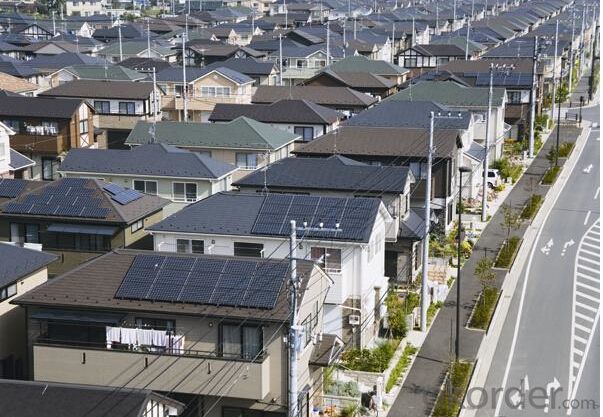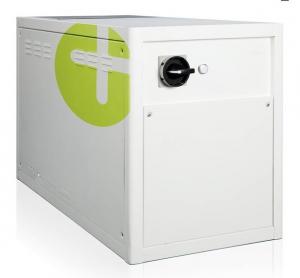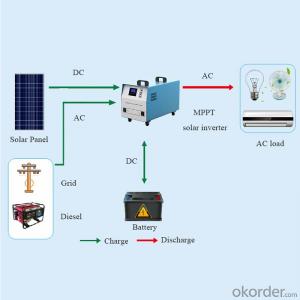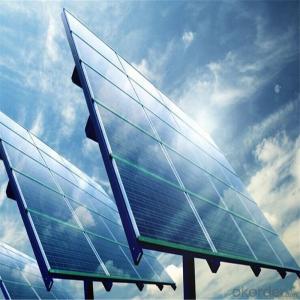5kW Floating Solar Energy System
- Loading Port:
- China Main Port
- Payment Terms:
- TT or LC
- Min Order Qty:
- -
- Supply Capability:
- -
OKorder Service Pledge
Quality Product, Order Online Tracking, Timely Delivery
OKorder Financial Service
Credit Rating, Credit Services, Credit Purchasing
You Might Also Like
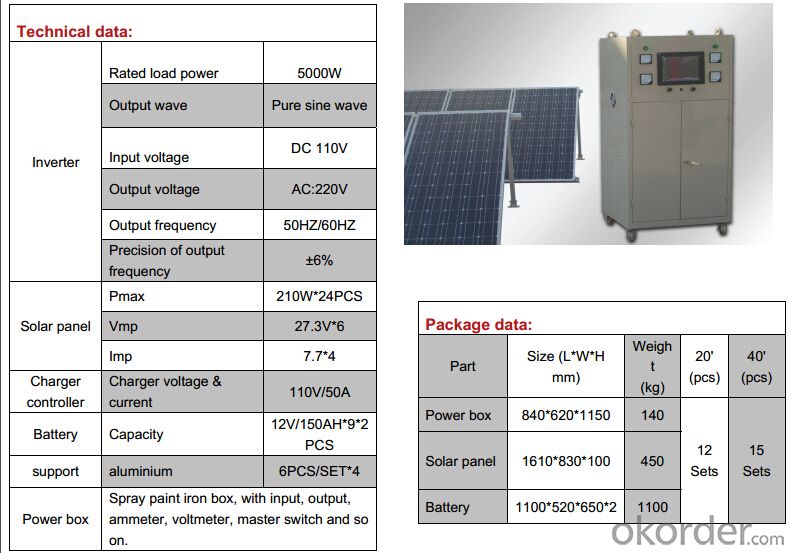
- Q: Can solar energy systems be used in remote areas?
- Yes, solar energy systems can be used in remote areas. They are particularly well-suited for such locations because they do not require a connection to a centralized power grid. Solar panels can be installed in remote areas to harness sunlight and generate electricity, providing a sustainable and reliable source of energy. This makes solar energy systems an ideal solution for powering remote communities, scientific research stations, or off-grid projects in isolated regions.
- Q: Are solar energy systems affected by hail or other weather conditions?
- Yes, solar energy systems can be affected by hail or other extreme weather conditions. Hailstorms can potentially damage solar panels, reducing their efficiency or causing them to break. Additionally, severe weather conditions such as heavy rain, snow, or strong winds can affect solar energy production temporarily. However, modern solar panels are designed to withstand such weather events to a certain extent and are often tested for durability and impact resistance.
- Q: How do solar energy systems impact water usage?
- The utilization of solar energy systems greatly reduces water usage in comparison to traditional fossil fuel power plants, leading to a positive impact. Solar power operates without the need for water, whereas conventional power plants consume large quantities of water for cooling purposes. This excessive water consumption can be harmful to local ecosystems and water resources, particularly in regions with limited water availability. Furthermore, solar energy systems indirectly aid in water conservation by decreasing the dependence on other energy sources that require significant amounts of water. By transitioning to solar power, the necessity for coal or natural gas power plants, which consume vast quantities of water for cooling and extraction processes, can be reduced. This reduction in water usage not only helps preserve local water resources but also addresses water scarcity concerns faced by many areas. Moreover, solar energy systems can be integrated with water management infrastructure to optimize water usage. For example, solar panels can be installed on reservoirs or other bodies of water, providing shade and reducing evaporation rates. This aids in water conservation and the maintenance of reservoir levels, which are essential for agriculture, drinking water supply, and ecosystem well-being. In conclusion, solar energy systems have a positive impact on water usage by eliminating the need for water consumption in electricity generation and reducing reliance on water-intensive energy sources. Additionally, solar power can be combined with water management infrastructure to optimize water usage and conserve water resources. Embracing solar energy allows us to contribute to a more sustainable and water-efficient future.
- Q: Can solar energy systems be installed on mobile homes?
- Yes, solar energy systems can be installed on mobile homes.
- Q: What is the role of a solar energy system installer?
- Solar energy system installers have a vital role in the transition to renewable energy sources. They are responsible for designing, installing, and maintaining solar energy systems in residential, commercial, and industrial buildings. Their main objective is to ensure that solar panels are installed correctly and functioning efficiently. To begin with, installers evaluate the site where the solar panels will be placed. They consider factors such as location, orientation, and shading to determine the best design and positioning of the panels. This involves conducting a comprehensive analysis of the site's solar potential and taking into account any potential obstacles that may affect the system's performance. Once the design is finalized, installers acquire the necessary equipment and materials for the installation. This includes solar panels, inverters, mounting systems, and electrical components. They also ensure compliance with local building codes and regulations. The installation process involves securely mounting the solar panels on rooftops or the ground. Installers then connect the panels to the building's electrical system and wire them to the inverters. A strong understanding of electrical systems is crucial to ensure a safe and efficient connection. After the installation, installers carry out thorough testing and commissioning to verify that the system is functioning correctly. This includes checking the electrical connections, monitoring system performance, and addressing any issues that may arise. In addition to installation, installers are responsible for providing maintenance and repair services. They regularly inspect the panels, clean them, and replace any damaged or faulty components to ensure optimal performance and durability. They may also assist with system upgrades or expansions as required. Overall, the role of a solar energy system installer is essential in promoting the adoption of renewable energy. They are responsible for the successful installation and maintenance of solar energy systems, enabling individuals and businesses to decrease their dependence on fossil fuels and contribute to a more sustainable future.
- Q: Can solar energy systems be leased or rented?
- Yes, solar energy systems can be leased or rented. Leasing or renting solar energy systems allows individuals or businesses to enjoy the benefits of solar power without the upfront costs of purchasing and installing the equipment. This option is becoming increasingly popular as it offers a more affordable and flexible way to access clean and renewable energy.
- Q: Can solar energy systems be used for powering electric vehicle autonomous driving systems?
- Yes, solar energy systems can be used to power electric vehicle autonomous driving systems. Solar panels can be installed on the roof or other surfaces of the vehicle to capture sunlight and convert it into electricity. This electricity can then be used to charge the vehicle's battery, which in turn powers the autonomous driving systems. However, the energy generated from solar panels may not be sufficient to solely power the autonomous driving systems, and additional sources of power or energy storage may be required for optimal functionality.
- Q: Can a solar energy system be installed on a parking garage or structure?
- Certainly, it is entirely possible to install a solar energy system on a parking garage or structure. As a matter of fact, these locations are often considered ideal for solar installations due to their expansive surface areas and access to sunlight. The utilization of available space can be maximized by mounting solar panels on the roof or external walls of parking structures. Furthermore, the raised position of parking garages enables better exposure to sunlight, resulting in more efficient generation of solar energy. Furthermore, the installation of a solar energy system on a parking garage or structure can yield numerous advantages, including the generation of clean and renewable energy, reduction in electricity costs, and offsetting of carbon emissions. This choice therefore proves to be a sustainable and environmentally friendly option for energy production.
- Q: Can solar energy systems be used in areas with frequent hurricanes?
- Yes, solar energy systems can be used in areas with frequent hurricanes. While it is true that hurricanes can cause damage to solar panels and other components of solar energy systems, there are measures that can be taken to mitigate these risks. Firstly, the design and installation of solar energy systems in hurricane-prone areas can be done to withstand high winds. This includes using stronger mounting systems, reinforced frames, and secure anchoring techniques. Additionally, the orientation and tilt angle of the panels can be optimized to minimize wind resistance. Furthermore, regular maintenance and inspections can help identify any potential issues or damage to the system before a hurricane hits. This allows for timely repairs or replacements, ensuring the system remains functional and safe during extreme weather events. In the event of a hurricane, it is important to have emergency procedures in place to secure the solar panels and other components. This can involve temporarily removing the panels and securing them indoors or utilizing protective covers to shield them from debris. Moreover, the use of microinverters or power optimizers in solar energy systems can enhance their resilience in hurricane-prone areas. These technologies allow each solar panel to operate independently, mitigating the impact of any damage to a single panel and preventing the entire system from shutting down. Lastly, solar energy systems can also contribute to the resilience of communities during and after hurricanes. With proper battery storage, solar systems can provide backup power during power outages, allowing essential services to continue operating and providing electricity for critical needs such as lighting, refrigeration, and medical equipment. Overall, while precautions need to be taken to ensure the durability and functionality of solar energy systems in hurricane-prone areas, they can be effectively used to harness clean and renewable energy even in the face of frequent hurricanes.
- Q: Can solar energy systems be used for powering off-grid research stations in Antarctica?
- Yes, solar energy systems can be used for powering off-grid research stations in Antarctica. Solar panels can be installed to capture and convert sunlight into electricity, which can then be stored in batteries for use during periods of low or no sunlight. This renewable energy source can provide a reliable and sustainable power supply for the research stations, reducing the dependence on fossil fuels and minimizing environmental impact.
Send your message to us
5kW Floating Solar Energy System
- Loading Port:
- China Main Port
- Payment Terms:
- TT or LC
- Min Order Qty:
- -
- Supply Capability:
- -
OKorder Service Pledge
Quality Product, Order Online Tracking, Timely Delivery
OKorder Financial Service
Credit Rating, Credit Services, Credit Purchasing
Similar products
Hot products
Hot Searches
Related keywords

